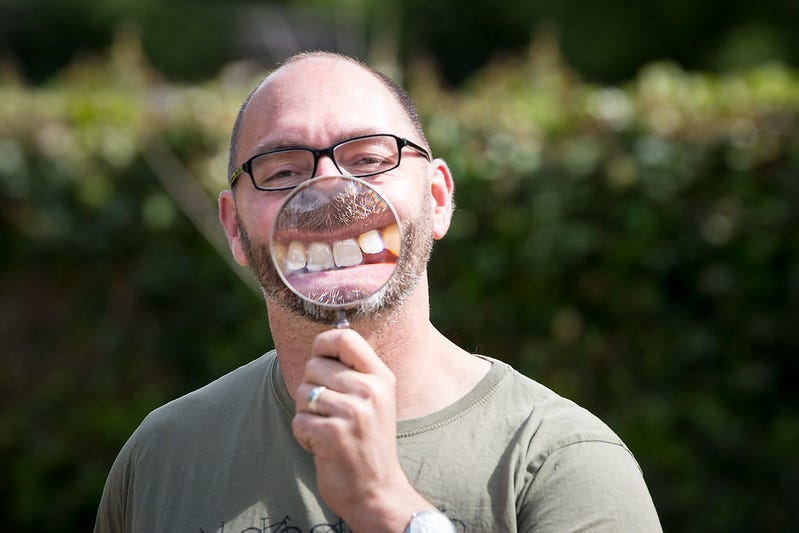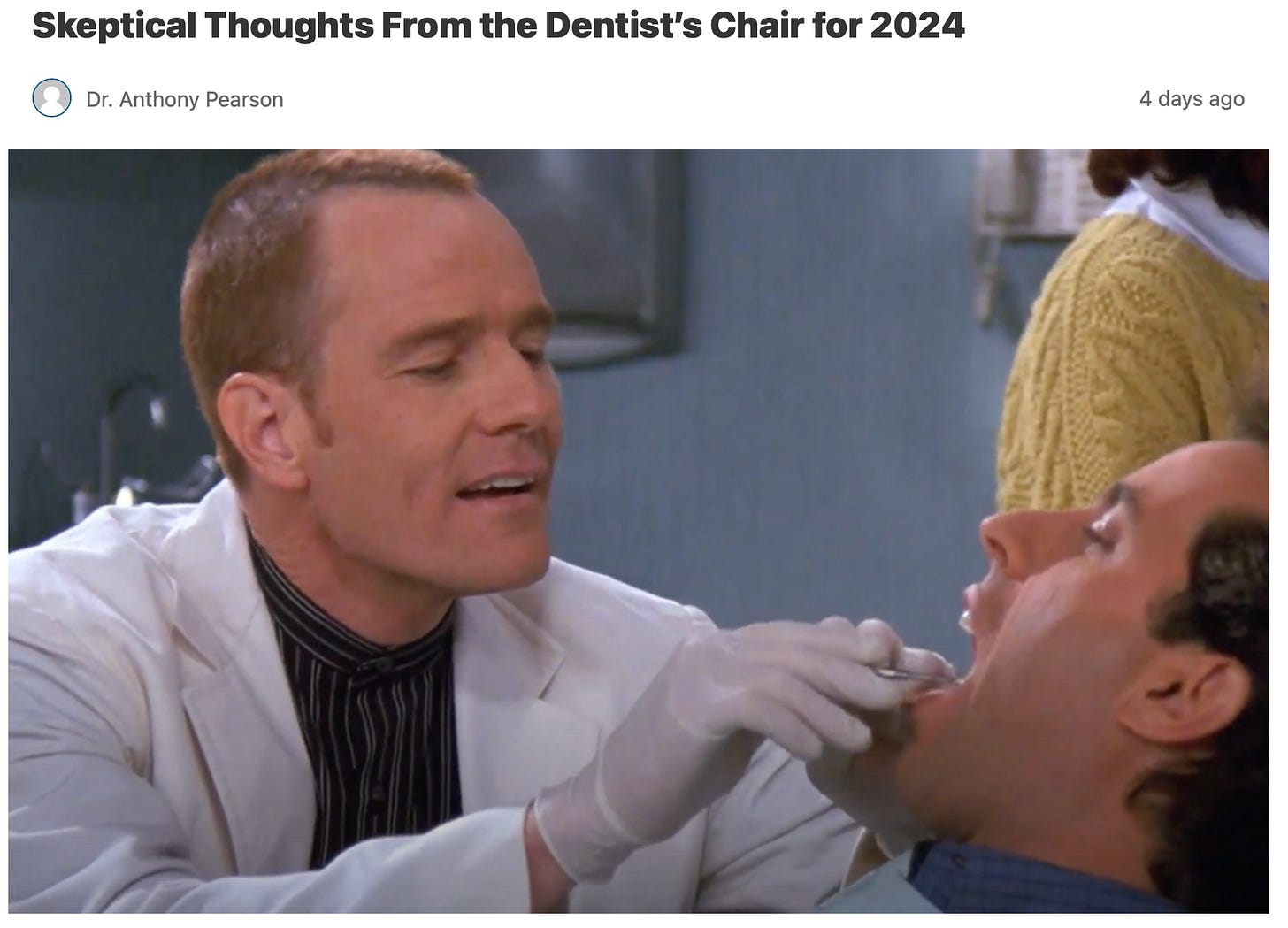Overdiagnosis and overtreatment in dentistry
More informed public dialogue would be helpful for all
I’ve often wondered why we don’t hear more about evidence-based dentistry - or as much about overdiagnosis and overtreatment in dentistry as we hear about in medicine. I’ve wondered about it in my own dental care. And, as I often do, I wonder why there hasn’t been more healthy skepticism in journalism about dentistry. Recently a couple of items caught my eye.
Earlier this year, the journal JAMA Internal Medicine published an opinion piece, “Too Much Dentistry.” Excerpt:
“Little progress has been made on using data from clinical trials to determine best practices for dental care. Instead, most dental care relies on practice patterns influenced by the economic pressures of running a dental practice, dentists’ professional training and opinions, and patients’ expectations, all of which tend to favor excessive diagnoses and interventions. The result is that while many people who have low income go without any dental care, those who can pay are subjected to overdiagnosis and overtreatment.”
The authors emphasized that they “do not want to give the impression that dental care is not important.” Instead, they conclude:
“Identifying which dental procedures are beneficial and ensuring that relevant dental associations update their guidelines accordingly provide an opportunity to allocate resources to those who need them the most.”
An accompanying commentary in the same journal challenged several of the statements made by the “Too Much Dentistry” article. But the challenge concluded with this:
“However, this moment also represents a critical opportunity for the dental profession to exceed its current limitations and transcend its current boundaries. The progression toward evidence-based practices is well underway…Moving forward, these research efforts must be complemented by the formal guidelines of relevant associations and regulatory bodies, thereby ensuring the highest standard of dental care for the population.”
Followup letters to the editor of that journal raised concerns about too many dental x-rays, and about this reminder:
“that dentistry is among the few remaining health care professions where clinical examination, diagnostic testing including radiographs, diagnosis, treat- ment planning, and treatment are all performed in 1 place, often by the same care practitioner. This model of care delivery prevents external oversight of the entire process.”
I had a difficult time finding much news coverage of the “Too Much Dentistry” journal article, which covered a broad range of concerns about dental services including treatment of cavities, the push for 6-month (or even shorter) intervals between checkups, and scaling and polishing.
Egregious examples of criminal, fraudulent dentistry occasionally make headlines. In 2022 The Washington Post reported, “A dentist broke his patients’ teeth on purpose so he could fix them. Prosecutors say he made millions.” That year the Lown Institute gave this story one of its Shkreli Awards (named after convicted former pharma CEO and health care hedge fund co-founder Martin Shkreli ) - awards given for “the worst in healthcare profiteering & dysfunction.” (Disclosure: I have been one of the judges for these awards.)
In October 2024, KFF Health News and CBS News investigated concerns about the huge jump in the number of dental providers now offering dental implant surgery. Excerpt:
“Amid this booming industry, some implant experts worry that many dentists are losing sight of dentistry's fundamental goal of preserving natural teeth and have become too willing to remove teeth to make room for expensive implants.”
In general, though, it seems as if dentistry is scrutinized in critical journalism far less often than medicine.
From the medical side just a few days ago, Anthony C. Pearson, MD, who writes as “The Skeptical Cardiologist,” published, “Skeptical Thoughts From the Dentist's Chair for 2024.” On his Substack page, he asks:
Do you really need those X-rays or that cleaning? Why does the rate of cavity detection vary so widely? Are we victims of too much dentistry?
He mentions the “Too Much Dentistry” piece in his article, which follows his two-part series from 2016 in which he “expressed doubts about the value of routine dental visits.” In those articles he compared what he says as a dental patient with what he sees in his medical practice with routine annual EKGs or routine stress testing after stent implants or questions about “the risk/benefit ratio of any annual medical evaluation.” The images below are hyperlinked to the earlier two-part series.
I urge you to sink your teeth into the hyperlinked articles above and reflect on whether you’ve been an informed dental patient. Have you asked questions about recommended treatments? Have you asked about data to support recommendations?
And I urge journalists to consider the questions raised in the articles above, and to reflect on how ripe the field is for good journalism. The Association of Health Care Journalists has some resources on dental topics, such as:
Deadly Dentistry: How Safe is Your State? (But some of their links no longer work.)
Dearth of dentistry: Reporter explores how state’s economic health affects its oral health
American dentistry, a parallel medical universe - the sometimes woeful state of American dental care
Covering a controversial study: How to dig deep on a deadline - fluoride
Background on the dental therapist movement to aid your reporting
Expanding use of dental hygienists continues to be a state-by-state battle
2018 state-by-state report card rates oral health among seniors - story ideas for many regions
Unnecessary prescribing of dental antibiotics may be adding to C. diff cases









Gary, great job on this story. After doing a lot of research on dental X-rays when I wrote my book on Screening, I found that there were a small but detectable increase in head and neck cancers which correlated with frequent x-raying of the jaw. Since then I have always resisted the pressure to keep getting additional x-rays, especially if I knew the dentists were on a fishing expedition and I had decent dental coverage, so it was clearly a revenue source for them. What happened the last time I went in for a routine cleaning the dental hygienist, anticipating I was again going to refuse the offer of X-rays, asked me to sign a waiver, essentially saying that if I refused the X-rays they wanted a record of that refusal, so down the road if I had any problems, they will have covered their asses. Hmmm. It was a bit disturbing. I thought of that for a bit and wondered maybe I should develop my own waiver and ask her to sign it. It would say, in the event I develop throat or neck cancer, they would be liable for their contribution to the development of that cancer by repeatedly x-raying me and not forewarning me of the small but significant increases in cancers related to the X-rays. I didn't bring such a form, but the coercive nature of the interaction left a pretty bad taste in my mouth.
I'm delighted to have you writing again, Gary. You were missed.